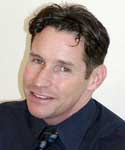-
- Conservatives vow lengthy P&G boycott over gay rights
- McGreevey order creates needle-exchange programs in New Jersey cities
- ‘Uncensored’ website stirs up Idaho high school newspaper
- Cipel says McGreevey harassment was ‘continuous nightmare’
- Medical marijuana advocates press feds
- Troubled SoCal religious network cancels live ‘Praise-a-thons’
- National News Briefs
- World News Briefs
commentary
Anti-gay bias in print media
Published Thursday, 04-Nov-2004 in issue 880
BEYOND THE BRIEFS
Several local newspapers don’t allow gays and lesbians to place ads seeking long-term relationships. It’s a practice that has gone on for well over a decade, not without challenge from many in this community, including GLBT persons in both the straight and gay media. The general counsel for Copley Enterprises told me years ago that the practice was because the paper is a “family” publication.
As for the main local “alternative” paper, The Reader, you may find stories about men who claim they are no longer gay. But you won’t find ads seeking same-sex partners because the publisher has prohibited personals from gays and lesbians.
What if African Americans and Latinos couldn’t advertise for partners or advertise for business in any other papers besides those that cater to their communities? Wouldn’t we all consider this discrimination and racism?
Now the latest wrinkle in antigay bias by the media involves a move by the San Diego Business Journal, San Diego’s premier business paper.
The Greater San Diego Business Association (GSDBA) put on its second expo, to show businesses how to cater to the GLBT market. GSDBA contracted with the Journal to place the expo’s program in the paper. (Inserts are the most effective means of advertising because, as readers, we can’t miss them.) According to the Gay & Lesbian Times, the acting publisher vetoed the contract. He returned all the money GSDBA paid and gave it $12,000 in free ad space. This act, coupled with the paper’s refusal to cover the expo, gave some GSDBA officials cause to think the paper had engaged in antigay bias.
Regardless of the motives behind the actions of these papers, it’s fairly clear that they feel as though they can take such action with complete impunity. They seem to think that the First Amendment insulates them from legal liability from anti-discrimination laws. But that hasn’t been the law for the last 40 years.
In 1990, along with the late Tom Homann, I drafted the Homann Dignity Ordinance (HDO), a local law that prohibits bias by every kind of business. People may mistakenly believe it only applies to housing and job bias – no, not true.
“… you won’t find ads seeking same-sex partners because the publisher has prohibited personals from gays and lesbians.” The print media, like the electronic media, is subject to federal, state and local laws barring discrimination.
Let’s be clear. The First Amendment prohibits the government from requiring newspapers to print or not print something. That’s how it should be. The government shouldn’t be able to prohibit a newspaper from publishing anything, save for articles that could endanger lives or national security.
Likewise, the government should not be able to compel a paper to publish certain ads, including personals ads. But when a newspaper decides to publish ads for services that discriminate on the basis of protected classes, such as race and sexual orientation, the courts are uniform in holding papers liable for contributing to illegal behavior.
The advertising part of a newspaper is commercial speech. In the same way a newspaper may not publish white-only ads, newspapers may not single out gay and lesbian advertisers. Imagine the outcry if our leading papers didn’t allow Christians or Caucasians to place personal ads because of religious and racial bias.
In drafting the HDO, I certainly had in mind practices I’ve outlined above. Even in 1990, both the Union-Tribune and The Reader prohibited same-sex ads. The Union-Tribune doesn’t allow the use of the term “gay”; however, people can seek straight partners.
I drafted the language of the HDO from laws that federal courts had upheld and that applied to all businesses providing services. There is no exemption for businesses that provide news. When the HDO was before our city council, it was ironic that the Union-Tribune editorialized in favor of the HDO, yet its own advertising staff refused to permit same-sex ads.
Specifically, the HDO makes it unlawful to “print, publish or advertise a service that engages in anti-gay bias.” It makes no difference that the service advertised is owned or partnered with the newspaper.
The U.S. Supreme Court has not only upheld damage awards against newspapers for publishing discriminatory ads, the court has also upheld laws that prohibit papers from publishing gender-based ads, for example, “jobs for men”. The court indicated that when the commercial activity is illegal, the restriction on advertising is incidental.
The HDO allows the city attorney to prosecute violations of the act. By writing this commentary, I hope you will all join me in asking the new city attorney to finally enforce the HDO. I’ve waited 15 years.
|
|
Copyright © 2003-2025 Uptown Publications


